
Dodge City is the county seat of Ford County, Kansas, United States, named after nearby Fort Dodge. As of the 2020 census, the population of the city was 27,788. The city is known in American culture for its history as a wild frontier town of the Old West.

Peabody is a city in Marion County, Kansas, United States. As of the 2020 census, the population of the city was 937. The city was named after F.H. Peabody of Boston, former vice-president of the Atchison, Topeka and Santa Fe Railway. Peabody is well known in the region for its Independence Day Celebration on July 4, and its historic 1880s downtown main street. It is located between Newton and Florence along U.S. Route 50 highway.

The Carnegie Library of Pittsburgh is the public library system in Pittsburgh, Pennsylvania. Its main branch is located in the Oakland neighborhood of Pittsburgh, and it has 19 branch locations throughout the city. Like hundreds of other Carnegie libraries, the construction of the main library, which opened in 1895, and several neighborhood branches, was funded by industrialist Andrew Carnegie. The Pittsburgh area houses the first branches in the United States.
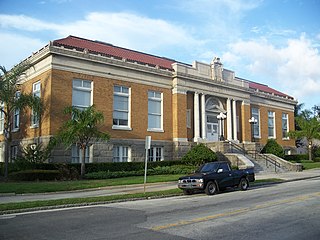
For other Carnegie Libraries, see Carnegie library (disambiguation)

The Detroit Public Library is the second largest library system in the U.S. state of Michigan by volumes held and the 21st-largest library system in the United States. It is composed of the Main Library on Woodward Avenue, which houses the library's administration offices, and 23 branch locations across the city. The Main Library is part of Detroit's Cultural Center Historic District listed in the National Register of Historic Places adjacent to Wayne State University campus and across from the Detroit Institute of Arts.

Gratz Park is a neighborhood and historic district located just north of downtown Lexington, Kentucky. It was named after early Lexington businessman Benjamin Gratz whose home stands on the corner of Mill and New streets at the edge of Gratz Park. The Gratz Park Historic District consists of 16 contributing buildings including the Hunt-Morgan House, the Bodley-Bullock House, the original Carnegie Library in Lexington, and several other private residences. Gratz Park occupies a tract of land that was established in 1781 outside the original boundaries of Lexington.

The Argentine Branch Library, sometimes known as the Argentine Carnegie Library is a building located at 2800 Metropolitan Avenue in the Argentine neighborhood of Kansas City, Kansas that formerly served as a branch of the Kansas City, Kansas Public Library (KCKPL).

The Music Hall Center for Performing Arts is a 1,731-seat theatre located in the city's theatre district at 350 Madison Street in Downtown Detroit, Michigan. It was built in 1928 as the Wilson Theatre, designated a Michigan State Historic Site in 1976, and was listed on the National Register of Historic Places in 1977.
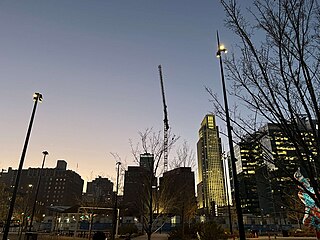
Downtown Omaha is the central business, government and social core of the Omaha-Council Bluffs metropolitan area, U.S. state of Nebraska. The boundaries are Omaha's 20th Street on the west to the Missouri River on the east and the centerline of Leavenworth Street on the south to the centerline of Chicago Street on the north, also including the CHI Health Center Omaha. Downtown sits on the Missouri River, with commanding views from the tallest skyscrapers.

The Lewiston Public Library is a historic public Carnegie library at Park and Pine Street in Lewiston, Maine.

The Woodland Public Library is the oldest, and one of the last functioning Carnegie-funded libraries in California. It is on the National Register of Historic Places and is a contributing property of the Downtown Woodland Historic District.
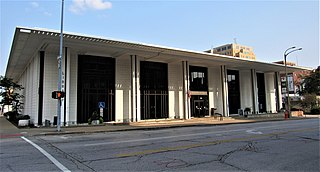
The Davenport Public Library is a public library located in Davenport, Iowa. With a history dating back to 1839, the Davenport Public Library's Main Library is currently housed in a 1960s building designed by Kennedy Center architect Edward Durell Stone. The Davenport Public Library system is made up of three libraries—the Main Library at 321 Main Street; the Fairmount Branch Library at 3000 N. Fairmount Street (41°33′06″N90°37′54″W); and the Eastern Avenue Branch Library at 6000 Eastern Avenue (41°34′59″N90°33′12″W).
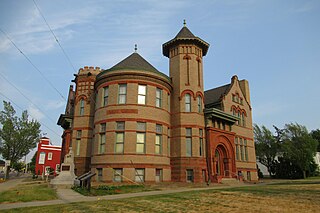
The Adrian Public Library is a historic structure located at 110 East Church Street in downtown Adrian, Michigan. Originally used as a library, it was designated as a Michigan Historic Site on December 14, 1976, and later listed on the National Register of Historic Places on December 6, 1977. It is located within the Downtown Adrian Commercial Historic District and adjacent to the Adrian Engine House No. 1. Today, the building houses the Lenawee County Historical Society Museum.

This is intended to be a complete list of the properties and districts on the National Register of Historic Places in Downtown Davenport, Iowa, United States. Downtown Davenport is defined as being all of the city south of 5th Street from Marquette Street east to the intersection of River Drive and East 4th Street. The locations of National Register properties and districts may be seen in an online map.
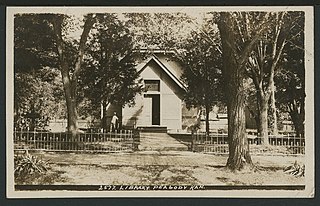
Peabody Historical Library Museum, also known under the older name of Old Peabody Library, was listed on the National Register of Historic Places (NRHP) in 1973. It is located in the Downtown Historic District of Peabody, Kansas. The building has state significance because it was the first free tax-supported library in Kansas.

Peabody Township Library, also known under the older name of Peabody Township Carnegie Library, was listed on the National Register of Historic Places (NRHP) in 1987. It is located in the Downtown Historic District of Peabody, Kansas, United States.
The East Orange Public Library is the free public library of East Orange, Essex County, New Jersey

The Everett Carnegie Library is a Carnegie library building located in Everett, Washington, USA listed on the National Register of Historic Places and part of the Snohomish County Government campus. The building occupies the southeast corner of the intersection of Oakes Avenue and Wall Street in the city's central business district.

The Fletcher Free Library is the public library serving Burlington, Vermont. It is located at 235 College Street, in an architecturally distinguished Beaux-Arts building, constructed in 1902 with funding support from philanthropist Andrew Carnegie. The building was listed on the National Register of Historic Places in 1976.
Charles Wesley Squires (1851–1934), also known as C.W. Squires, was an American architect in Emporia, Kansas. A number of his works are listed on the National Register of Historic Places.


















